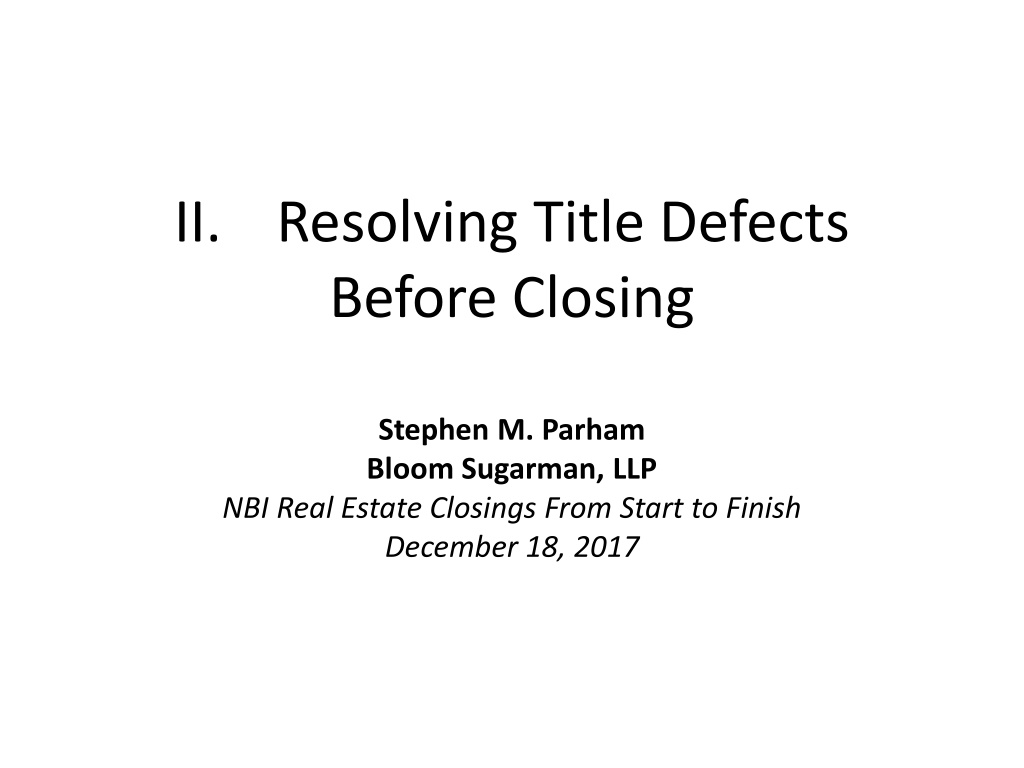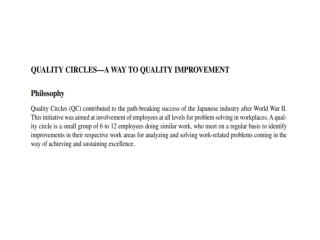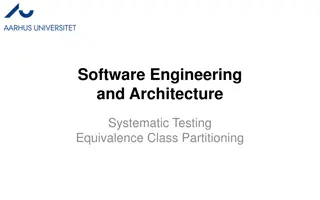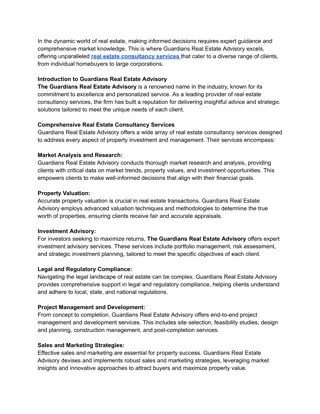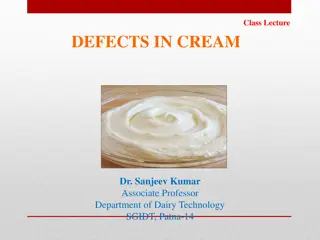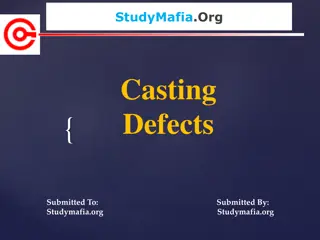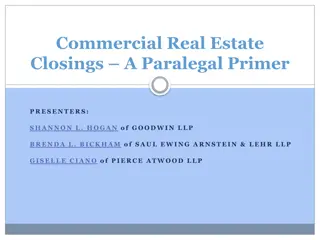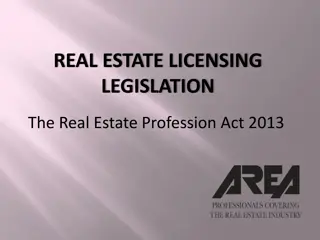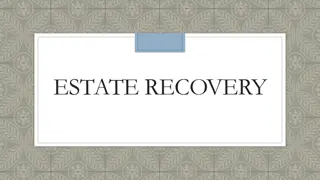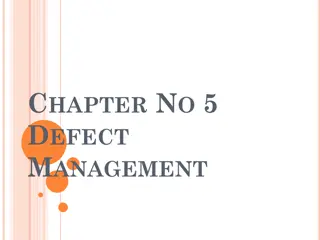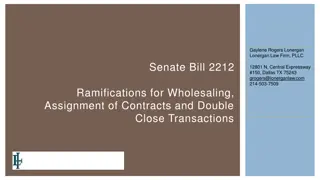Understanding Title Defects in Real Estate Closings
Marketable title signifies a clear ownership chain, insurable title allows for insurance coverage against known defects, while apparent and real breaks in title require different resolutions to ensure a property's marketability. Dealing with title defects is crucial in real estate transactions to safeguard ownership rights and property value.
Download Presentation

Please find below an Image/Link to download the presentation.
The content on the website is provided AS IS for your information and personal use only. It may not be sold, licensed, or shared on other websites without obtaining consent from the author. Download presentation by click this link. If you encounter any issues during the download, it is possible that the publisher has removed the file from their server.
E N D
Presentation Transcript
II. Resolving Title Defects Before Closing Stephen M. Parham Bloom Sugarman, LLP NBI Real Estate Closings From Start to Finish December 18, 2017
Marketable Title Marketable means that the chain of ownership (title) to a particular piece of property is clear and free from defects. As such, the property can be marketed for sale and transferred without additional effort by the seller or potential buyer.
Insurable Title Insurable title does, or may have, a known defect or defects in the chain of title. However, with an insurable title, a title insurance company has agreed in advance to provide insurance against the defects ever affecting the ownership or value of the property
Why does it matter? If a property does not have a current, valid title insurance policy and there is a defect in the chain of title, then the defect must be cured or repaired before a seller can convey marketable title. If there is a current policy, rather than curing or fixing the defect, which can be very expensive and time consuming, the title insurance company may elect to insure against any problem the defect may cause in the future. Some defects in title may never become a problem or threaten the value or ownership of the property.
Apparent Breaks in Chain of Title Apparent breaks are not actually breaks in the chain of title. They are cases or situations in which certain necessary information, reflecting actual facts, have not been filed for record. Common Types of Apparent Breaks: Unrecorded Instruments. Matters of Probate. Matters of Corporation. Divorce Proceedings in Different Jurisdictions. Proof of Death. Variation in Names.
Real Breaks in Chain of Title Conversely, real breaks are actual breaks in the chain of title. These situations cannot be cured by adding certain additional information to the records. These situations relate to parties who claim and hold certain rights, title or interest in the property which are adverse to those being claimed by the present record owners. These real breaks can be corrected by the elimination of the rights and interests of these claimants through one of the following methods: The execution and filing for record of a proper quitclaim deed. The filing and completion of a quiet title action or a trespass to try title action with a certified copy of the final judgment or decree filed for record. The provisions of the state's marketable title act, if any. In some jurisdictions, by recording an affidavit of adverse possession relative to the uninterrupted period of adverse possession established by state law.
Real Breaks in Chain of Title (Contd) Types of Real Breaks in Chain of Title: Errors in public records. Unknown liens. Illegal deeds. Missing heirs. Forgeries. Undiscovered encumbrances. Unknown easements. Boundary/survey disputes. Undiscovered will. False impersonation of previous owner. Easements.
Other Potential Title Issues Adverse Possession. Adverse possession is a method of acquiring title to real estate. The essential elements of an adverse possession sufficient to create title to land in a claimant are: Owner is ousted of possession and kept out uninterruptedly Requisite period of time (Ex: 20 years) Open, visible, and exclusive possession by the claimant Claim of right Intention of using the property Without owner's consent. Whatever the period required in the particular jurisdiction and under the particular circumstances, title by adverse possession cannot be acquired unless it is shown that the adverse possession continued for that specific period.
Curative Instruments Rental Division Order Lease Ratification. Lease Amendments Lease Amendments - Extension of Primary Term Release of Lien, or Deed of Trust Subordination Agreement Quitclaim Deed (See below) Escrow Agreement (See below) Affidavit of Joint Tenancy Affidavit of Identity Affidavit of Heirship Affidavit of Adverse Possession Affidavit of Use and Possession
Quit Claim Deeds As opposed to a warranty deed, a quitclaim deed does not offer any guarantees that the owner has good title or even ownership at all; it simply conveys whatever interest exists at the time of the deed s signing. When there is a cloud on the title, the title insurance company may require a quitclaim deed in order to restore marketability of the owner s title. Record the quitclaim deed with the clerk of the appropriate court in the county where the property is located. This provides official notice of the land transfer and makes the instrument part of the public record; if unrecorded, it may be void to subsequent purchasers for valuable consideration
Escrow Agreements Escrow agreements may involve postponed delivery of the deed, the purchase price, mortgage or security deeds and notes, or all of these items. Escrows enable parties to close a sale or loan without waiting for clearance of all liens or claims against the property by escrowing part or the entire purchase price to be disbursed upon receipt of all the necessary cancellations or occurrence of other conditions. Some thing to look for in a valid escrow agreement include: writing actual contract between the real parties at interest an absolute deposit of an instrument or other proper subject matter pursuant to the agreement, the instrument passes out of control of the depositor to withdraw the deposit; the person to whom the instrument or other subject matter is delivered must, by mutual consent, act as the agent of both parties; the agreement must contain a delivery provision, in which the grantor/escrowormakes delivery to the grantee/escrowee.
Title Endorsements Endorsements are used to modify the coverage of a title insurance policy on real property. There are various title insurance policies made available to owners of real property by title companies including standard coverage, but, if a sale or assignment is complicated, or, if there are specific problems unique the deal at hand, it may be desirable to expand the policy coverage in order to protect the Seller, Buyer, and/or Lender in the transaction. Endorsements can modify any part of the title policy; however, they are most commonly used to expand the standard title policy for more comprehensive coverage in order to address either a particular title issue affecting or potentially affecting the real property in question
Common Types of Endorsements Comprehensive Endorsement Condominium Endorsement. Planned Unit Development (PUD) Endorsement Mineral Endorsement Use of Easement Encroachments on Adjoining Property Encroachments on Easements EPA Endorsement Variable Rate Mortgage Endorsement
More Endorsements Negative Amortization Date Down Endorsement Modification Agreement Environmental Protection Lien Zoning (Unimproved Land) Zoning (Improved Land) Access
